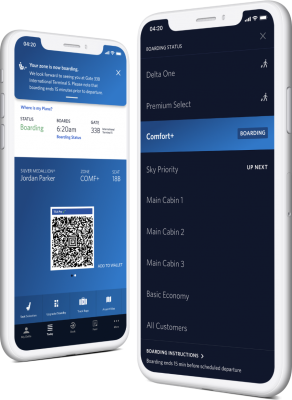

New travel tech experiences driving safety, hygiene and efficiency
As countries across the world emerge from lock down, international travel is beginning to resume, and safety is emerging a top priority for travelers. The travel industry is well advanced in developing innovative new technologies to drive safety, hygiene and efficiency across every aspect of the travel experience.
In this blog, we explore five emerging technologies currently being deployed across the travel industry to identify new, viable solutions and experiences which may define the new normal in travel.
Contactless Travel
Contactless travel will be the most obvious change from airport to hotel sectors. Bio-metrics are already a widely accepted solution for identity verification and more touchless options are being piloted. Such as gesture control, touchless document scanning and voice commands.
Contactless check-in: Hilton will double-down on its award-winning Digital Key technology for guests who desire to have a contactless arrival experience. Guests can determine the amount of contact they prefer when they check-in, as well as choose their room and access their room with a digital key using their mobile device through the Hilton Honors mobile app.
Contactless kiosks: United Airlines installed touchless check-in technology in all US airports and international airports. The contactless technology allows travelers to print luggage tags through a mobile scanning or printed boarding pass without having to physically touch a screen.
Source: Business Travel News
Digital Health Passports
An increasing number of countries are now exploring ways to provide travelers with digital health passports to allow them to travel abroad. The digital health passport is a web-based platform that certifies an individual’s health status, including COVID-19 and other health considerations, prior to travel.
Digital Identity
Digital Identity, including personal identity and health information, is fast becoming the new norm in travel. Travelers will be able to securely store their identity and health credentials within a digital wallet for required risk assessments prior to travel and for airport experiences, such as digital check-in via their mobile devices, to minimize queuing and physical contact at the airport.
Digital ID for a seamless journey: With IATA’s concept of One ID, travelers will be able to further streamline their journey with a document-free process based on identity management and bio-metric recognition.
“We are looking to global standards to help passengers navigate the airport without having to prove their identity over and over. IATA’s One ID project proposes face, iris or fingerprint recognition to seamlessly move passengers from curb to gate. The technology exists today. And we will be urging governments-vital partners to make One ID work-to move quickly.” Alexandre de Juniac, Director General and CEO, IATA.
Travelers will be able to identify themselves at each airport touch point through a simple bio-metric recognition to eliminate repetitive processes, resulting in less waiting queuing and a more seamless journey.
Automated Retail and Mobile Ordering
Automated retail and mobile ordering is a new concept being explored by retailers to allow travelers to make purchases using mobile devices to increase efficiencies and reduce non-essential physical interactions and cash payments.
Airport food pre-ordering and delivery: AtYourGate, an online in-airport ordering and delivery service, available in ten major hub airports in the US. Through the app, you can order and have food delivered directly to your gate. Passengers can avoid long lines and crowded food courts to get a meal.
Virtual Queuing
In support of social distancing, real person queuing may gradually be replaced by virtual queuing to prevent close congregation in one area. Virtual queuing technology allows airlines to notify travelers via their app when their seat is ready for boarding and enables airports to control queue entry.
Virtual queuing for boarding: Delta has added virtual queuing technology into its mobile app helping to reduce gate area queues to make the boarding processes more efficient. Passengers will receive a personal notification when their specific seat zone is getting ready to board.

Image Source: Delta Air Lines
The information in this article is sourced from third parties. CTM does not take responsibility for its accuracy or currency. CTM recommends travelers seek independent information prior to travel.

